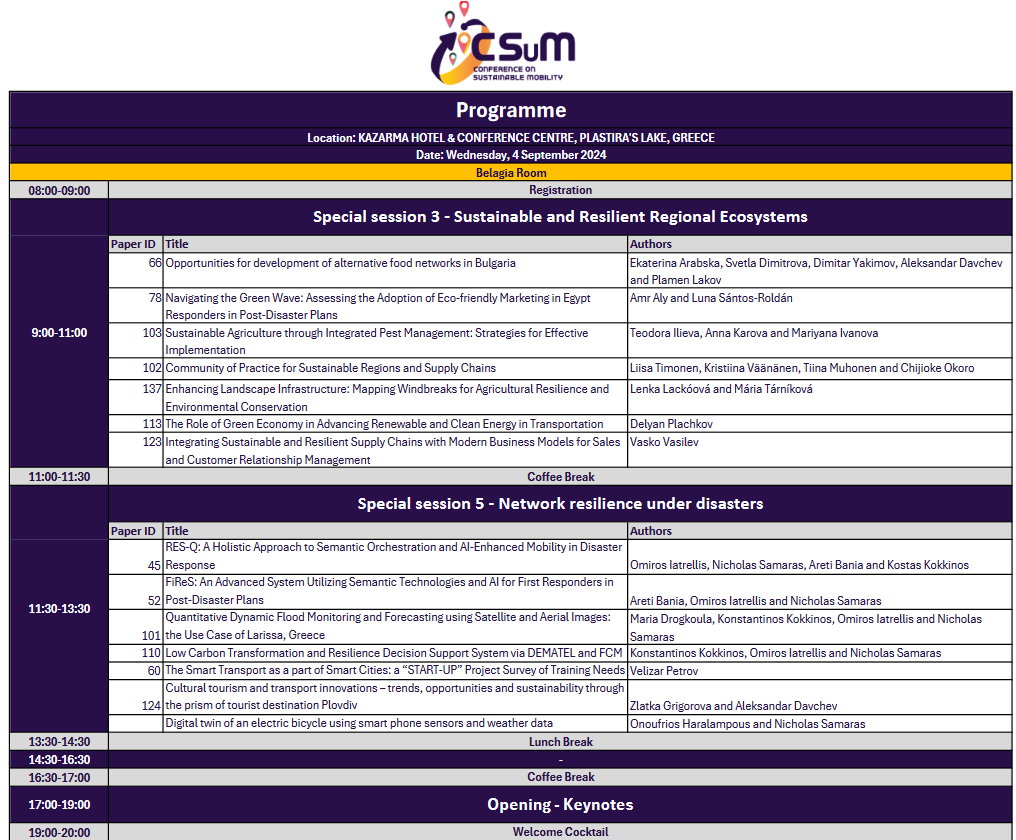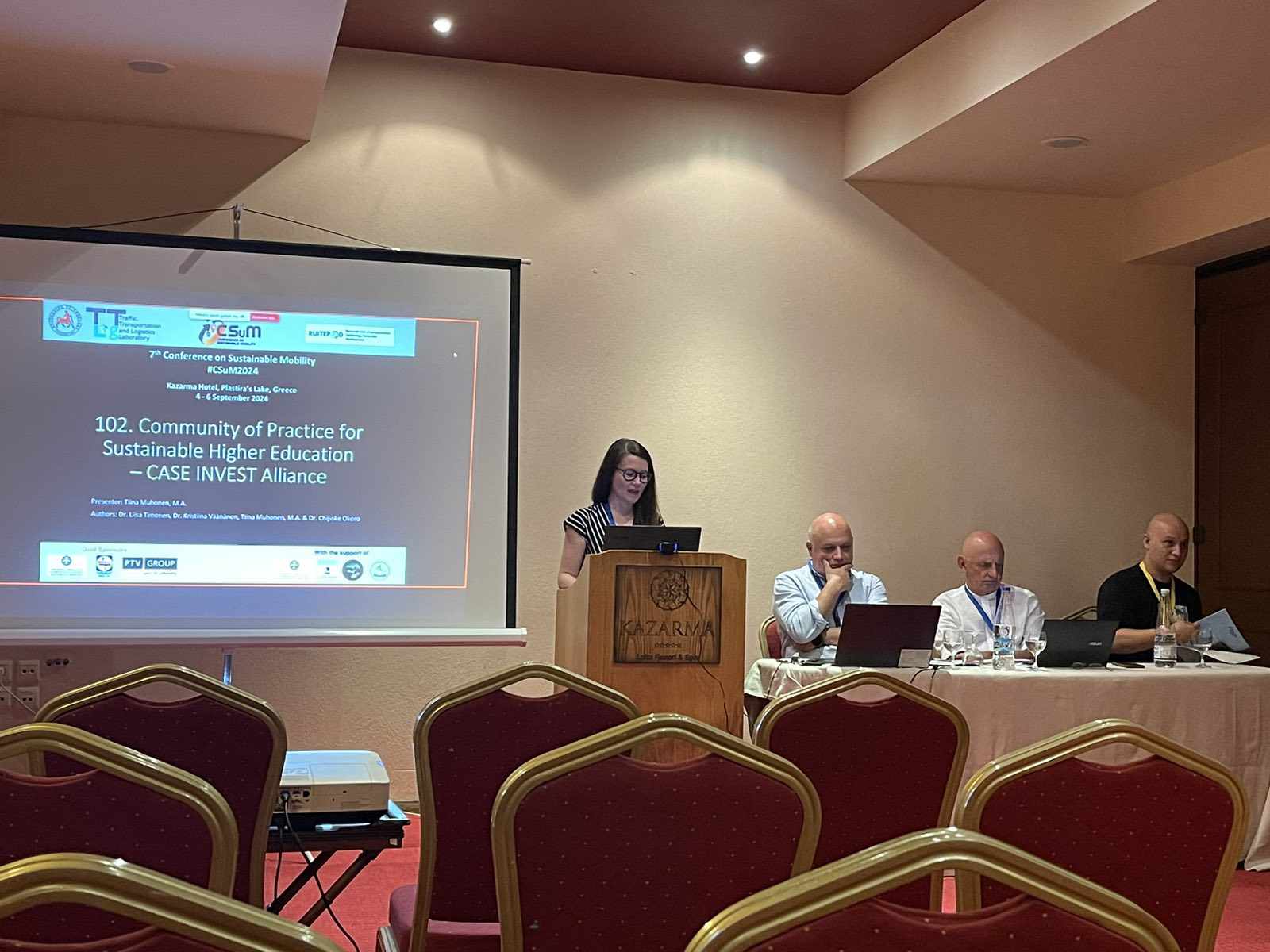The CSUM 2024 Conference, organized by University of Thessaly, held at the scenic KAZARMA Hotel & Conference Centre beside Plastira's Lake, Greece, featured 2 compelling sessions. A total of 27 authors from the INVEST European University participated in the special sessions at the CSUM 2024 conference.
Overview of Special Session 3: Sustainable and Resilient Regional Exosystems
Moderated by Konstantinos Kokkinos and Nicholas Samaras, this session presented a variety of insights into sustainable agricultural practices, innovative regional development, and resilient supply chains
Development of Alternative Food Networks in Bulgaria
Ekaterina Arabska, Svetla Dimitrova, Dimitar Yakimov, Aleksandar Davchev, and Plamen Lakov explored successful alternative food networks in Bulgaria, showcasing their potential to drive sustainable regional growth.
Eco-friendly Marketing in Egypt
Amr Aly and Luna Sántos-Roldán analyzed the shift towards eco-friendly marketing in Egypt, particularly in the wake of disasters, presenting a thorough assessment of business adaptations to green marketing strategies.
Sustainable Agriculture through Integrated Pest Management
The benefits of integrated pest management were detailed by Teodora Ilieva, Anna Karova, and Mariyana Ivanova, emphasizing its significance in sustainable agricultural practices that reduce environmental impact.
Sustainable Regions and Supply Chains
Liisa Timonen, Kristiina Väänänen, Tiina Muhonen, and Chijioke Okoro discussed the integration of sustainable practices in regional development and supply chains, illustrated by the Case INVEST Alliance.
Agricultural Resilience via Landscape Infrastructure
Innovations in mapping windbreaks to boost agricultural resilience and conservation efforts were presented by Lenka Lackóová and Mária Tárníková.
Green Economy in Transportation
Delyan Plachkov focused on the integration of renewable energy within the transport sector, highlighting its role in fostering a green economy.
Modern Business Models for Sustainable Supply Chains
Vasko Vasilev explored the integration of sustainable and resilient supply chain practices with modern business models, particularly in sales and customer relationship management.
Overview of Special Session 5: Network Resilience Under Disasters
Also moderated by Konstantinos Kokkinos and Nicholas Samaras, this session delved into the resilience of network systems amidst disasters, featuring groundbreaking research and technologies aimed at enhancing disaster response and network resilience.
Semantic Orchestration in Disaster Response (RES-Q)
A holistic approach utilizing AI and semantic orchestration to improve disaster response efficiency was introduced by Omiros Iatrellis, Nicholas Samaras, Areti Bania, and Kostas Kokkinos through their RES-Q project.
Semantic AI for First Responders (FiReS)
Areti Bania, Omiros Iatrellis, and Nicholas Samaras showcased an advanced system that employs semantic technologies and AI to aid first responders, emphasizing innovation in disaster management.
Flood Monitoring and Forecasting
A quantitative approach to flood monitoring in Larissa, Greece, using satellite and aerial imagery was presented by Maria Drogkoula, Konstantinos Kokkinos, Omiros Iatrellis, and Nicholas Samaras, providing crucial real-time data.
Decision Support for Low Carbon Transformation
Konstantinos Kokkinos and Omiros Iatrellis demonstrated the use of DEMATEL and FCM in supporting decision-making for low-carbon transformations and resilience building.
Smart Transport in Smart Cities
Velizar Petrov discussed the START-UP project’s findings on training needs for smart transport systems within smart cities, crucial for urban resilience.
Cultural Tourism and Transport Innovations
The link between cultural tourism and transport innovations in Plovdiv was explored by Zlatka Grigorova and Aleksandar Davchev, focusing on sustainability and new opportunities.
Digital Twin Technology for Electric Bicycles
The application of digital twin technology in optimizing electric bicycle performance using smartphone sensors and weather data was discussed by Onoufrios Haralampous and Nicholas Samaras.




